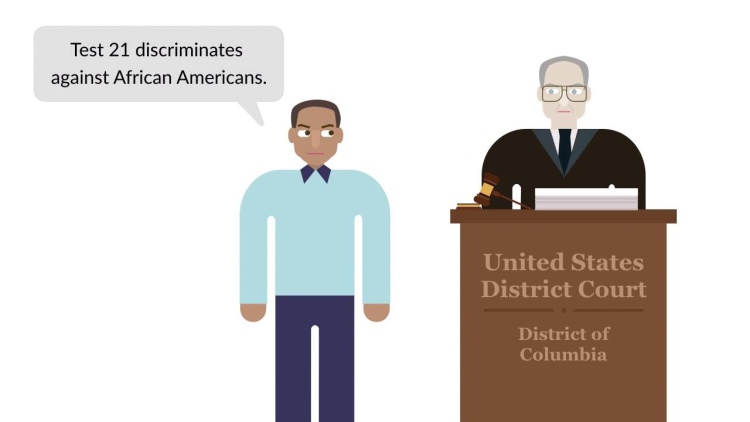Washington v. Davis
United States Supreme Court
426 U.S. 229, 96 S. Ct. 2040, 48 L. Ed. 2d 597 (1976)
- Written by Jamie Milne, JD
Facts
As part of the application process for becoming an officer in the District of Columbia (DC) Metropolitan Police Department (department), applicants were required to receive a certain score on a skills test. The written test assessed verbal ability, vocabulary, and reading comprehension. Fail rates were four times higher for Black applicants than White applicants. As part of a broader suit regarding the department’s hiring and promotion practices, multiple rejected Black applicants (plaintiffs) filed a claim against officials affiliated with the department (the officials) (defendants), including DC mayor Walter Washington. The rejected applicants argued, among other things, that the application test discriminated against Black applicants and was therefore unconstitutional because it violated equal protection. The district court held in the officials’ favor, noting that there was no allegation of discriminatory intent, only discriminatory effect. Additionally, the number of Black officers in the department was substantial, even if not fully representative of local demographics, and the department was actively recruiting Black applicants. The district court therefore reasoned that the application test was not discriminatory and did not violate equal protection. The court of appeals, however, held that the test was unconstitutional. It relied on cases interpreting Title VII of the Civil Rights Act (Title VII) to conclude that discriminatory effect alone was sufficient to render the test unconstitutional. The United States Supreme Court granted certiorari.
Rule of Law
Issue
Holding and Reasoning (White, J.)
Concurrence (Stevens, J.)
Dissent (Brennan, J.)
What to do next…
Here's why 904,000 law students have relied on our case briefs:
- Written by law professors and practitioners, not other law students. 47,100 briefs, keyed to 995 casebooks. Top-notch customer support.
- The right amount of information, includes the facts, issues, rule of law, holding and reasoning, and any concurrences and dissents.
- Access in your classes, works on your mobile and tablet. Massive library of related video lessons and high quality multiple-choice questions.
- Easy to use, uniform format for every case brief. Written in plain English, not in legalese. Our briefs summarize and simplify; they don’t just repeat the court’s language.





